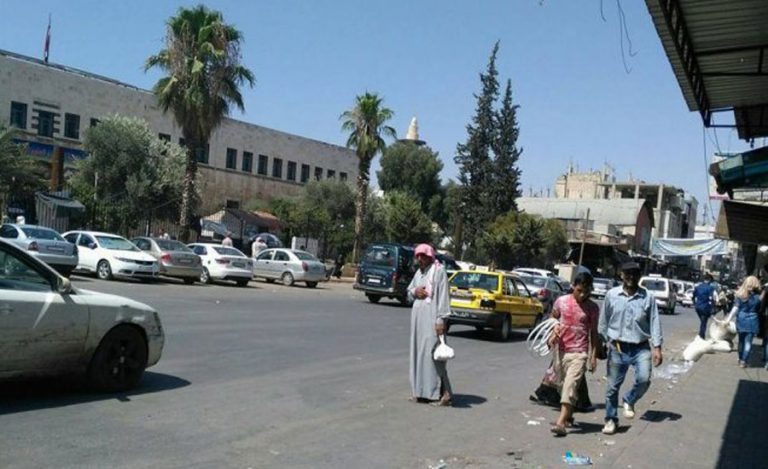Not long after the regime’s recent decision to remove its military checkpoints from the “safe” areas under its control, such as in the city of Hama, and the withdrawal of forces positioned there to the fronts in the south and east of Syria, life for civilians in these areas began to turn around.
Maed, a man in his 20s from the city of Hama, said that he could not believe what he saw on the first day after the removal of the checkpoints in the city. He had grown used to passing more than five regime checkpoints and being subjected to inspection at every one throughout the last seven years. This had become part of his daily life. Going to his shop in the Ibn al-Rushd market should take about a quarter of an hour in a microbus, but passing through the checkpoints needed about half an hour between checking IDs and the traffic. Today, life has begun to return to normal.
But the regime has maintained its checkpoints at the exits and entrances of the city under the pretext of protecting it from infiltrators. On its southern entrance, there are still members of the military security branch stationed at their same security barriers. The air force security is at the city’s west and east, while the regime maintains a presence around military points and residential areas which it has turned into military centers — but without inspection points or closing the roads before them, which has led to the opening of all roads for the first time in seven years.
A slap to the regime
Abou Mohamad, an employee at one of the state institutions in Hama, told Sada al-Sham that life in Hama city had changed radically with the removal of the regime checkpoints there. The city at night before the removal of the checkpoints had resembled a ghost town, as residents had stuck to their homes with the approach of the evening prayer, keeping the streets of the city empty after that. Today, there are restaurants and cafes full until midnight, while city parks are filled with people until 1 a.m., especially with the opening of new stores and cafes in various areas, which has led to revived economic movement restoring life to the city and the opening of markets at night, even if in a limited scope.
However, the people, according to Abou Mohamad, are afraid of the regime’s usual behavior, caused by explosions and news about terrorist “sleeper cells” whenever security forces withdraw from city checkpoints to military hotspots. This decision to remove the checkpoints came as a slap to regime fighters and their officers in Hama, as it means an end to the huge financial resources they were earning at the checkpoints every hour through tolls and bribes which the soldiers imposed on everyone passing through.
Shutting off this major resource has led to major problems for the regime in the city, as these checkpoints and tolls were key to calming the discontent of the regime fighters, some of whom have spent seven years in compulsory service, as well as being deprived of their rights such as leave and family visits. Today, after the removal of the checkpoints, there is nothing left pushing these fighters to overlook their rights, which were taken away by officers.
Explosion and expectations of more
Residents did not have to wait long before their fears and worst expectations were realized. About two weeks ago, a terrorist explosion ripped through the entrance of the western garage at the Tripoli roundabout in the city. No opposition group has claimed this explosion, in addition to the fact that it occurred in a residential area, which sparked suspicions around its nature and the group standing behind it.
On this basis, the people of Hama city expect a series of other explosions in more crowded areas, as some regime fighters pull out to active fronts in eastern Syria and others are removed from some centers and returned to security branch bases distributed in the city.
This article was translated and edited by The Syrian Observer. Responsibility for the information and views set out in this article lies entirely with the author.


